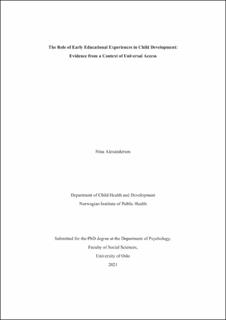| dc.description.abstract | Using data from the Norwegian Mother, Father and Child Cohort Study (MoBa), as well as data collected from the children’s teachers in ECEC (at 5 years) and school (at 8 years), this thesis seeks to expand the knowledge on the environmental factors that shape child development. Specifically, the thesis focuses on Early Childhood Education and Care (ECEC) as an important environmental context for child development. Children from less advantageous socioeconomic backgrounds are argued to benefit most from attending ECEC. Nevertheless, the benefits of ECEC for child development are critically dependent on quality. In the first paper, we investigate potential socioeconomic inequalities regarding access to quality in ECEC, in a context where universal policies are expected to ensure equal access for all children. However, limited evidence exists on whether universal policies have succeeded in achieving this goal. We found some indications of socioeconomic inequalities in the access to quality in ECEC, suggesting selection as one of the potential mechanisms. The children of higher-educated parents appeared to access a higher structural quality that together with the parental SES predicted a better relationship quality with their teachers. In the second paper, we examine some of the mechanisms between different aspects of quality, child functioning and well-being in ECEC. The results suggest that structural quality aspects influence children mainly indirectly via its impact on the relationship quality. Further, we employed a sibling design to address omitted variable bias in the associations between the student-teacher relationship and child outcomes. The associations between the relationship quality (in terms of closeness) and child functioning were relatively strong, even after accounting for relevant child characteristics and unobserved stable family factors. In the third paper, we extend our investigation to school age children, linking their relational experiences with teachers in ECEC and school to their behavioral outcomes outside the educational context (as observed by their mothers). Specifically, we study the associations between student-teacher closeness and conflict and children’s internalizing and externalizing behavior. To strengthen the internal validity of the evidence we used conditional within-person and within-family models (individual and sibling fixed-effects). The overall results provided support for the importance of the student-teacher relationship for child behavioral functioning beyond the ECEC and school context. | |
